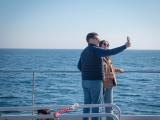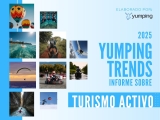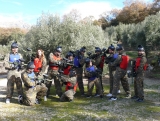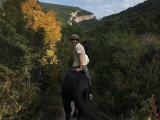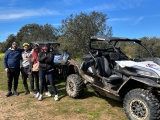In 1991, a tragedy occurred that not only shocked all Spaniards but also made Irene Villa be reborn. This journalist, psychologist, and athlete tells us how she overcame that fateful day and how she has carved a space for herself both in the media and in the world of adaptive skiing.
Ultimately, a brave woman who has known how to adapt to circumstances and who has future projects that will add to everything she has achieved so far.

Yumping.- With a degree in Audiovisual Communication, you've worked as a journalist in both print and radio. You still do so today. Tell us, was that always your calling?
Irene Villa.- Just before starting university, I said I wanted to study law to toughen sentences. I was told that was the politicians' job, but I never liked politics, so I decided that from behind a microphone, one could also influence society and even political life.

Y.- But on the other hand, you're a psychologist and teach classes on values in schools. What fulfils you the most among so many professions?
I.V.- Helping others, my family, and doing sports is undoubtedly what fulfils me the most. That's why speaking to young people is when I feel truly useful. It's heartwarming to see their amazed faces when I tell them I forgave those who planted a bomb on us, and hearing their questions and comments astonishes me and, in many cases, fills me with pride.
##10#
Y.- After the attack you suffered as a collateral victim, you kept fighting and shaping your own destiny, shedding the label of an ETA victim. Given the media pressure, was it difficult?
I.V.- No, at one point I said, "that's enough," and the journalists respected me, though they still call to ask me about terrorism. What's hard is being allowed not to comment on it. I tell them there are other victims to ask, but it's true our story was very well-known, and 20 years after the attack, we're still here.

Y.- When did you decide to start skiing? Were the beginnings tough?
I.V.- The first time was in 2005, but I wanted to quit forever because of how badly it went. I picked it up again in 2007, straight onto the Team of the Fundación También, still very scared but eager to pave the way for other women with disabilities who wanted to compete, as before this team, there was no female category in sit-skiing.

Y.- Did you face any obstacles when starting out?
I.V.- The mind is our biggest limit. I looked at those steep slopes and all I wanted was to get off the monoski. Little by little, I lost the fear, but it took a lot of willpower to keep doing what initially terrified me and has now become my passion. Thanks to overcoming that paralyzing panic on black runs, I can now enjoy the adrenaline they give.
Y.- Do you think the world of skiing is very competitive?
I.V.- All sports are, perhaps more so individual ones, but having created the world's first adaptive skiing team, we feel the support of our teammates and teamwork, which greatly lessens that competitiveness I've never liked.

Y.- In moments when life plays a bad trick on us, where our dreams or hopes may be shattered, how far do you think we can go to avoid being defeated?
I.V.- As far as each person wants. The only limit is the one you set for yourself.

Y.- What does sport mean to you?
I.V.- Quality of life, release, enjoyment, self-confidence... I feel amazing after swimming, for example, and after a double session in the snow, I'm happy.
Y.- What advice would you give to someone who wants to start snow sports and is in a situation similar to yours?
I.V.- To go for it and not let fear stop them, as it only makes us miss out on many wonderful things in life.

Y.- You've started the year very well, winning gold in the Spanish Cup and VI Santiveri Trophy. How far would you like to go in the world of sports?
I.V.- I'm not overly ambitious, as I have many other projects off the snow too, so I can't dedicate myself as fully as a Paralympian would, but I'd love to finish with good times in all the runs we'll do at the European Cup Final on 16th and 17th March in La Molina. Winning seems complicated because the European level is much higher than in our country, but one never loses hope.

Y.- With two books under your belt, you're working on a novel. When can we expect another film script?
I.V.- I have so many things pending... I have to take it step by step—first finish the editorial projects I'm working on, and later, the leap to a film script, which is what I've always loved, but all in good time.

Y.- You focus all your energy not only on moving forward and fighting every day, getting involved in new projects, but also helping others. What projects do you have in this area?
I.V.- I have a trip planned to Guinea with the Foundation "What Really Matters," and I still visit children with illnesses or disabilities, especially amputations, give talks, and attend charity events... Everything we can do for others will also benefit ourselves.

Y.- Where do you see yourself in ten years?
I.V.- In Madrid, as a mother.
Y.- Your greatest wish?
I.V.- The end of terrorism. Prosperity. A happy family.





